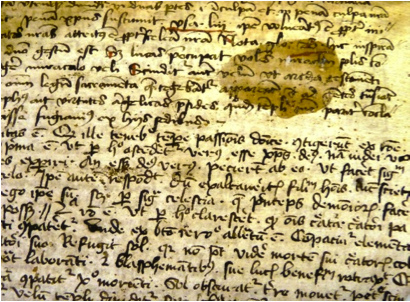
Image Credit:
In the last three decades, our understanding of early modern literature and culture has been enriched by a renewed attention to data that might be called "archival." Because of the proliferation of digital repositories such as Early English Books online, scholars and teachers have increasing home access to resources previously restricted to on-site consultation. While such archival material is often incorporated into graduate and advanced undergraduate teaching, there is also significant opportunity to employ it in the instruction of early-major and non-major literature students.
For teachers with access to EEBO (http://eebo.chadwyck.com/home), early modern printed documents provide an obvious way to supplement introductory class lectures and readings. (I routinely ask non-major students to read packets of "microtexts"—short, targeted selections from unedited early modern texts.) But in addition to such instructor-driven usage, I've had great success having students seek such data themselves. To conclude a unit on Hamlet, for example, I ask groups of students to brainstorm thematic clusters (revenge, ghosts, suicide, etc.) of contextual relevance; they employ these terms to search out EEBO documents that shed light on our understanding of the play. Initially, many students struggle to make sense of what they find—but the challenge is a productive one, and they ultimately seem to enjoy the experience of such detective work. The subsequent presentations and discussions enrich our collective understanding of the play, while exposing the class to a representative sampling of early modern documents. (For more on this lesson, see http://www.dwrl.utexas.edu/old/content/eebo-show-and-tell.)
Though less widely available than EEBO, Gale/Cengage State Papers Online (http://gale.cengage.co.uk/state-papers-online-15091714.aspx)—a vast collection of manuscript documents from the early modern period—is a digital archive that offers similar pedagogical opportunities. Because of the difficulties of reading early modern manuscripts, the students' use of this database requires a much higher degree of instructor-mediation—but, when documents are properly vetted, groups of students can enjoy a similar (and amplified) detective experience by attempting to transcribe material of low-paleographical difficulty. For instructors without access to State Papers Online, many suitable manuscripts are freely available elsewhere on the internet.
The increasing digitalization of documents from the early modern period has been crucial to scholarly production. It can also help enliven our teaching, at any level of the curriculum.

